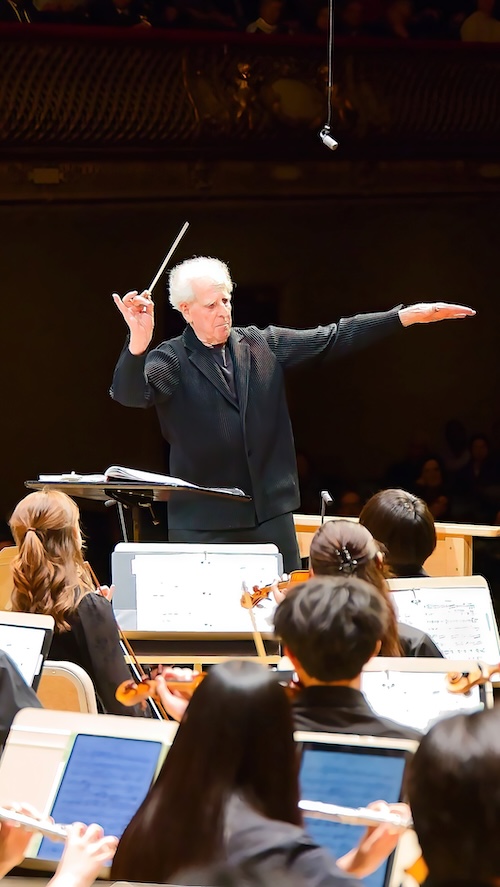Zander, Boston Phil Youths find triumph in the tragedy of Mahler’s Sixth

Benjamin Zander led the Boston Philharmonic Youth Orchestra in Mahler’s Symphony No. 6 Sunday at Symphony Hall. Photo: Hilary Scott
That the Boston Philharmonic Youth Orchestra has made a habit of performing the symphonies of Gustav Mahler shouldn’t blind one to the fact that doing so is completely out of the ordinary: this music was never intended to be played, let alone with professional credibility, by teenagers.
But exceeding the norm is what the ensemble does better than most and they managed the feat yet again on Sunday afternoon with a towering traversal of Mahler’s Symphony No. 6 at Symphony Hall.
Completed in 1904, the Sixth is, formally, Mahler’s most Classical effort. Expressively and emotionally, it is also his most expansive and, ultimately, his bleakest, with a coda that is among the repertoire’s most uncompromisingly nihilistic.
Yet the point of the music, as conductor Benjamin Zander pointed out in his pre-performance comments, isn’t oblivion. Rather, its focus is life, love, nature, accomplishment, activity—sometimes frenetic activity.
Fate intrudes on all of these and if, in the end, it triumphs, it doesn’t snuff out a hopeless spirit, but one that has striven—even in the face of impossible odds—to endure, prevail, and leave behind something worthwhile. As such, the Sixth cuts, perhaps, closer to the bone of life as it is actually lived than any other of Mahler’s eight completed entries in the genre.
It certainly sounded that way on Sunday. To be sure, the BPYO’s was a performance in which one could fully appreciate the 80-minute score’s vitality. The orchestra’s playing teemed with defiant energy, from the taut tread of the first movement’s opening march to the big dynamic contrasts of the Scherzo and the remarkable play of character on display in its supercharged finale.
The singularity of Mahler’s musical vision also emerged potently. Eerie textures, like the celesta’s doubling of the woodwinds’ first-movement chorale, flickered chillingly, as did the Scherzo’s xylophone solos; not to mention that section’s snarling, low-brass and -wind nods to Wagner’s Siegfried.
At the same time, there was uncommon delicacy, feeling, and precision in the BPYO’s delivery of the Sixth’s inward moments. The Allegro’s Alpine interlude shimmered, with pristine solos from concertmaster Michael Fisher, bass clarinetist Maxwell Reed, and principal horn Mauricio Martinez.
Even more striking was the ensemble’s account of the Andante, perhaps the single most beautiful movement Mahler ever wrote. On Sunday, all the required elements of intonation, tonal warmth, textural delicacy, and dynamic nuance were locked in. What emerged was exquisite, unadulterated music-making: an orchestra of 132 functioning as a true chamber group, leaving behind, for a transcendent fifteen minutes, any hint of technical concern to simply revel in pure, Mahlerian abstraction.
Sometimes it’s easy to lose sight of the fact that, given the BPYO’s extraordinary talent level and their supposedly youthful naivete, their leader is one of the day’s great Mahler conductors. Zander’s conception of the Sixth didn’t stint on highlighting many of its lovely details but he knew how to avoid getting sidetracked by them.
Indeed, there was something striking about the impellent tempos the 85-year-old maestro chose. Everything moved with purpose, even the lyrical bits. If, sometimes, this approach pushed a bit hard—the bridge into the Allegro’s “Alma theme” might have been more strongly shaped and the Scherzo’s “altväterisch” episodes were a touch literal—the conductor’s overarching vision paid dividends with the symphony’s larger structure as well as in individual movements.
That was particularly the case in the finale, where its 30 minutes unfolded with inexorable purpose. By the time the last, shattering crash arrived (Zander reinstituted the third hammer blow Mahler excised) there was no sense of futilely raging against the dying of the light: rather, the message of this Sixth was an admonition to embrace James Russell Lowell’s adage that fate loves the fearless.
The Boston Philharmonic Orchestra performs Mahler’s Symphony No. 2 at 8 p.m. April 18 at Symphony Hall. bostonphil.org
Posted in Performances